
Copyright 2010 by James Stuart Bell
Cover and internal design 2010 by Sourcebooks, Inc.
Cover image Comstock/Jupiter Images
Sourcebooks and the colophon are registered trademarks of Sourcebooks, Inc.
All rights reserved. No part of this book may be reproduced in any form or by any electronic or mechanical means including information storage and retrieval systemsexcept in the case of brief quotations embodied in critical articles or reviewswithout permission in writing from its publisher, Sourcebooks, Inc.
This publication is designed to provide accurate and authoritative information in regard to the subject matter covered. It is sold with the understanding that the publisher is not engaged in rendering legal, accounting, or other professional service. If legal advice or other expert assistance is required, the services of a competent professional person should be sought.From a Declaration of Principles Jointly Adopted by a Committee of the American Bar Association and a Committee of Publishers and Associations
Published by Sourcebooks, Inc.
P.O. Box 4410, Naperville, Illinois 60567-4410
(630) 961-3900
Fax: (630) 961-2168
www.sourcebooks.com
Library of Congress CIP Data is on file with the publisher.
Printed and bound in the United States of America.
VP 10 9 8 7 6 5 4 3 2 1
Dedication
This book is dedicated to my sister, Cathy Massarelli
Acknowledgments
Id like to especially thank Peter Lynch for acquiring this title and seeing it fit in this quality series, as well as introducing me to Sourcebooks. Also, appreciation goes to Kelly Bale and Anne Hartman for their fine editorial assistance.
Contents
Introduction
Given that youre reading this book, its a fairly safe bet that youre interested in the Bible, and you should be! The Bible is the bestselling book of all time, after all, with millions of copies produced every year. (Its the most quoted book of all time, too.) Beyond that, the Bible serves as the foundation of Christianity, Western literature, and modern law. Thousands of people have spent their entire lives studying the Bible, and millions of people base the most important decisions of their lives on what the Bible says.
But if thats true, then why does the world need something called The Bible Answer Book? If the Bible is that pervasive, shouldnt everyone have a good understanding of it by now? The answer is no, of course, because popularity does not always lead to understanding. Recognition does not lead to knowledge.
Its kind of like those fancy DVD players that people take home from Best Buy or Targetthe kind with all the different bells and whistles. Almost everyone has one at home (some people have several), and a great many people use them regularly, but how often have you encountered someone who has really explored what those DVD players can do? How often have you explored them yourself? Do you know what makes a progressive-scan DVD player different from other kinds? Do you look at digital pictures through your DVD player, or play MP3s? Can you even set the clock to the right time?
No, most of us keep things on the surface. We put a DVD in the slot, use the remote to press Play, and take the DVD out when the movie is over. Anything else just seems too complicatedthe rewards dont match the effort involved.
A lot of people feel the same way about the Bible. They take it off the shelf, carry it to church or to a Bible study, and then put it back on the shelf when they are finished. Even when people make an effort to read the Bible regularly on their own, they often feel confused about what it says or unsure about what to do. Or they just feel bored.
These feelings shouldnt be surprising. The Bible was written over a period of two thousand years by more than forty authors. It was written in three separate languages by people from cultures that look nothing like ours, and it has been translated over and over again through the centuries.
In other words, the Bible is a confusing book! Its also a supernatural book, though, a holy book, and a book that can help us change into the people we were meant to be. Its a book that is worth the effort of digging deeper and one that will reward us for our effort.
The Bible Answer Book can help you in that process. The chapter following this introduction will give you a better understanding of the ancient world and the cultural assumptions and expectations of the biblical authors. Chapter 2 will help you answer the question that we all need to address at some point in our spiritual walk: Can the Bible really be trusted?
In the middle chapters of this book, youll take a whirlwind tour through the pages of scripture that will help you answer fundamental questions about the Bibles authors, main characters, main places, and main events. Those chapters divide the Bible into its various literary genres, as follows:
The Pentateuch The first five books of the Bible, also known as the Books of the Law.
The Histories These historical narratives describe Gods continued interaction with the Jewish people and the establishment of Israel as a nation.
Wisdom and Poetry Written much differently from the historical books, this section delves into the heart and emotion of Gods interaction with humanity and our interaction with God.
The Prophets Throughout Israels history, God often spoke to his people and the people of other nations through human representatives. These books contain their words and deeds.
The Gospels and Acts The first four books of the New Testament record the life and ministry of Jesus through the insight and experience of four people. The Book of Acts serves as their sequel and tells the story of the birth of the church.
The Letters of Paul The apostle Paul was a leading figure in the early church, especially among the gentiles. These letters contain fruitful words of warning and instruction for Christians of all ages.
The General Epistles Other leaders of the early churchincluding Peter, James, and Johncontributed instruction for the first Christians, and sometimes correction for harmful practices and beliefs.
The Apocalyptic Books The literature of Apocalypse was a specific genre in the ancient world, with specific rules and structures. The Book of Daniel and the Book of Revelation follow these rules and need to be interpreted accordingly.
The final chapters of this book are focused on application. They explore the Bibles influence in the doctrine of Judaism and Christianity, as well as its contributions to modern ethics. The last chapter will help you learn several ways to use and connect with Gods Word every day.
Section 1
O VERVIEW
The revolutionary words of the Bible seek to change the course of our lives and point us in a new direction. This first section answers some key questions about the origins of the Bible. Where did the Bible come from and can it be trusted?
Chapter 1
T HE B IBLE AND A NCIENT C ULTURE
 Question 1. Other than the Israelites, what cultures were present in the ancient Middle East during the time of the Old Testament?
Question 1. Other than the Israelites, what cultures were present in the ancient Middle East during the time of the Old Testament?
 Question 2. What other historical events were occurring around the world during the time of the Israelites?
Question 2. What other historical events were occurring around the world during the time of the Israelites?
 Question 3. What was the geography of the Promised Land?
Question 3. What was the geography of the Promised Land?
Next page
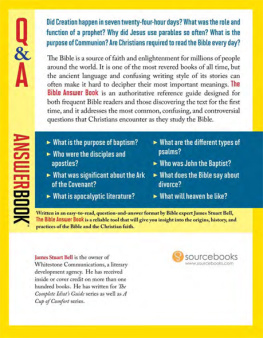
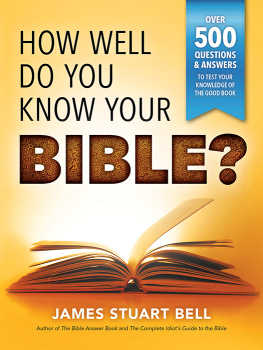

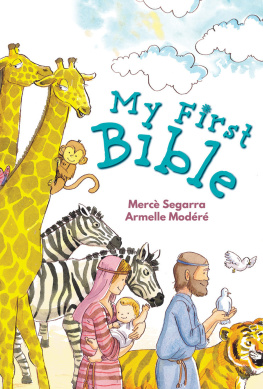
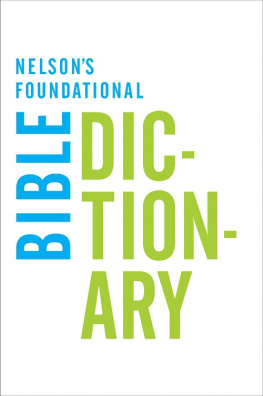
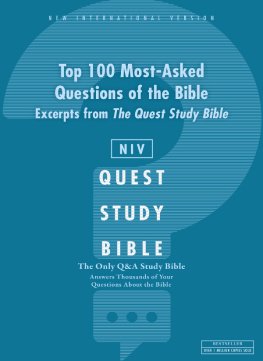
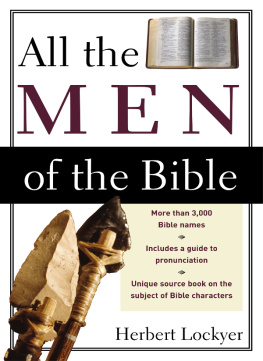
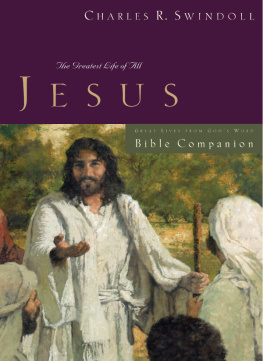
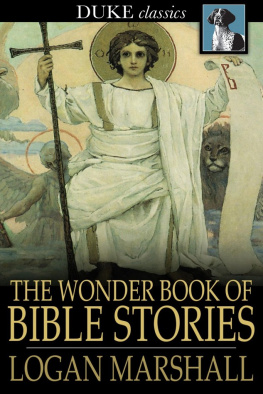
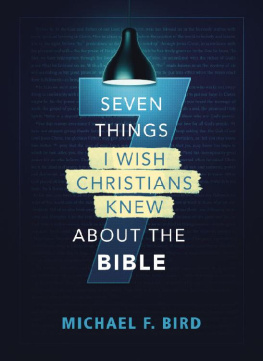
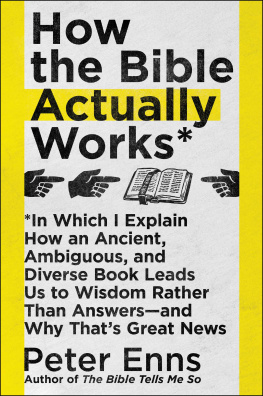
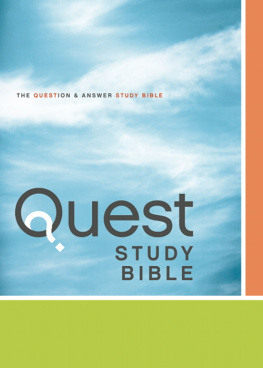
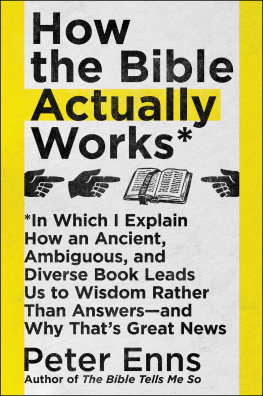
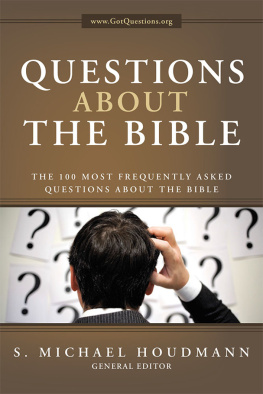

 Question 1. Other than the Israelites, what cultures were present in the ancient Middle East during the time of the Old Testament?
Question 1. Other than the Israelites, what cultures were present in the ancient Middle East during the time of the Old Testament?